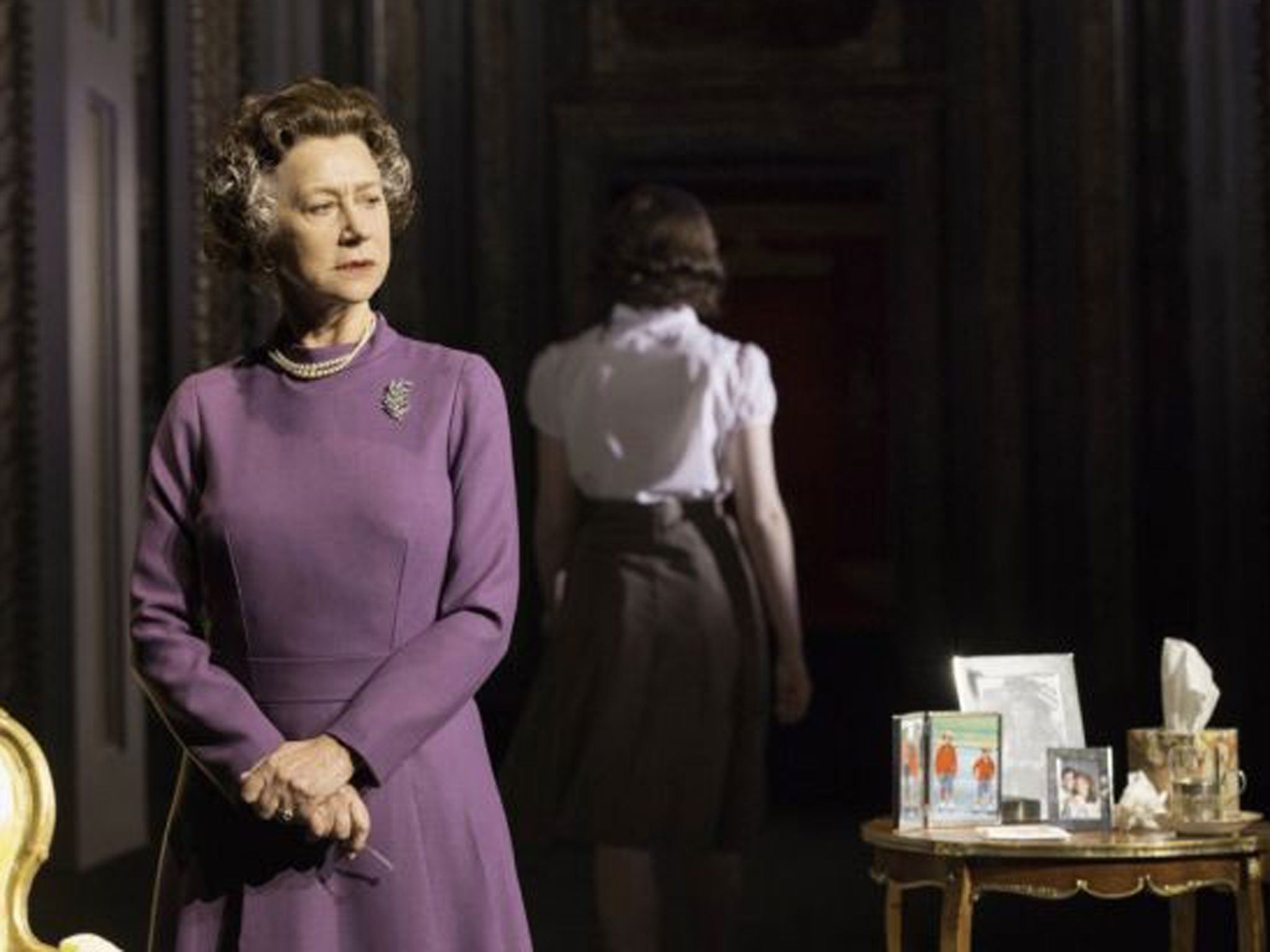Theatre review: The Audience - Bring on the dancing corgis
Yes, we are amused by Mirren's regal reprise – pity about Peter Morgan's script, though

Everyone needs a shoulder to cry on. Or is a stiffer upper lip what's required? When John Major starts blubbing, the Queen resorts to her patent-leather handbag, whisks out a hankie and flutters it in his direction – somewhere between a consoling gesture and a royal wave. He takes it gratefully and dries his eyes. Then, getting his etiquette in a twist, tucks it in his breast pocket.
Peter Morgan's new crowd-pulling and often entertaining play, The Audience – starring Helen Mirren as Elizabeth II – imagines what might have been said in the weekly meetings between the monarch and various prime ministers (from Churchill to Wilson to Cameron, although Blair is missing).
What's striking about the resultant dialogues, as directed by Stephen Daldry, is how magnanimously understanding The Audience is towards those in power – albeit stopping short of sycophancy. For sure, Major (a spot-on impersonation by Paul Ritter) is gently satirised. However, we glean that he's seriously wretched, too, in the wake of Black Wednesday. The stress of governing is a recurrent theme, the Queen expressing concern about several sleep-deprived PMs, including Michael Elwyn's pill-popping Anthony Eden and Nathaniel Parker's Gordon Brown.
In turn, the head of state has her own tear-jerking backstory. Morgan interweaves scenes in which Mirren converses – looking sad yet stalwart – with a child actress who represents Elizabeth's remembered adolescent self: an outdoorsy princess trapped, by her uncle's abdication, in the cold grandeur of Buckingham Palace. The backdrop resembles a magnificent mausoleum, with jet-black pillars.
As well as being classifiable as a spin-off from The King's Speech and the Morgan/Mirren film The Queen, The Audience is in line with a long tradition of stage dramas depicting the trials of sovereignty – not least Shakespeare's histories.
The big disappointment is the failure of this script to meld its biographical tidbits into credible dialogue. The protagonists' speeches are stashed with expositional facts and often seem improbable.
On the upside, we are amused. Behind closed doors, it appears that Her Majesty has a rapier wit, as well as some strong opinions, under the required air of neutrality. Mirren is uncannily like the real-life Elizabeth II, sitting with a slightly starched spine – her serenely folded hands betraying occasional twitches of royal irritation. Moreover, the actress transforms in a blink into the young queen, with dazzlingly quick wig and costume-changes and a higher-pitched, more nervous voice.
Edward Fox valiantly stands in as Churchill (replacing Robert Hardy at short notice), and Richard McCabe makes Wilson lovable, as well as impolite. That said, this soft-pedalling production starts to look sentimental, especially when the cameo roles extend to scampering corgis.
In Purple Heart (Gate Theatre, London ***), Carla (Amelia Lowdell) is sick of consoling gestures and neighbours poking their do-gooding noses into her private life. This is small-town America in the 1970s. She's a grieving Vietnam War widow with a drink problem and a kid who is worryingly keen on flame-throwers. This early play, from 2002, by Bruce Norris (of Clybourne Park fame) falls flat when Christopher Haydon's cast rattle off their lines like machine-gun fire, with no comic timing. However, this chamber production – played out in a claustrophobic, brown lounge – becomes increasingly tense and intriguingly weird. A wounded soldier (a spookily glazed and gaunt Trevor White) turns up on Carla's doorstep and quietly hangs around, ignoring her overbearing mother-in-law. A dark national allegory, perhaps.
Lastly, William Boyd, the novelist and screenwriter, has adjusted, intermeshed and dramatised a couple of short stories by Chekhov, "A Visit to Friends" and "My Life". The result is a two-tiered drama, Longing (Hampstead Theatre, London ***), centring on a pretty summer house on a country estate.
Iain Glen's Kolia, a romantically indecisive Moscow lawyer, is staying there, visiting friends from his youth. While they're trying to save the estate from bankruptcy, a love triangle forms. Meanwhile, working on the roof is William Postlethwaite's tousled Misail, idealistically roughing it as a labourer, but also betrothed to the nouveau-riche Dolzikhov's daughter. She has her eye on the property.
As unmarried, middle-aged Varia, Tamsin Greig is heartbreaking, with her unspoken yearning for Kolia cloaked in humour. And Glen's portrayal of Kolia's platonic myopia is exquisitely painful. Both are beautifully naturalistic, as is the setting: a sun-dappled glade, designed by Lizzie Clachan. Too bad the storylines feel only roughly hammered together and some among Nina Raine's cast are puzzlingly wooden, including John Sessions's lumbering Dolzikhov.
'The Audience' (0844 482 5130) to 15 Jun. 'Purple Heart' (020-7229 0706) to 6 Apr. 'Longing' (020-7722 9301) to 13 Apr
Critic's Choice
Brecht's A Life of Galileo is at the Swan, Stratford-upon-Avon (to 30 Mar), with Ian McDiarmid on top form as the feisty, wily scientist pitted against religious fundamentalism. This House has transferred to the NT Olivier: a triumph (running to 15 May) for James Graham's sharp, droll depiction of Westminster politics in the fractious 1970s.
Join our commenting forum
Join thought-provoking conversations, follow other Independent readers and see their replies
Comments
Bookmark popover
Removed from bookmarks